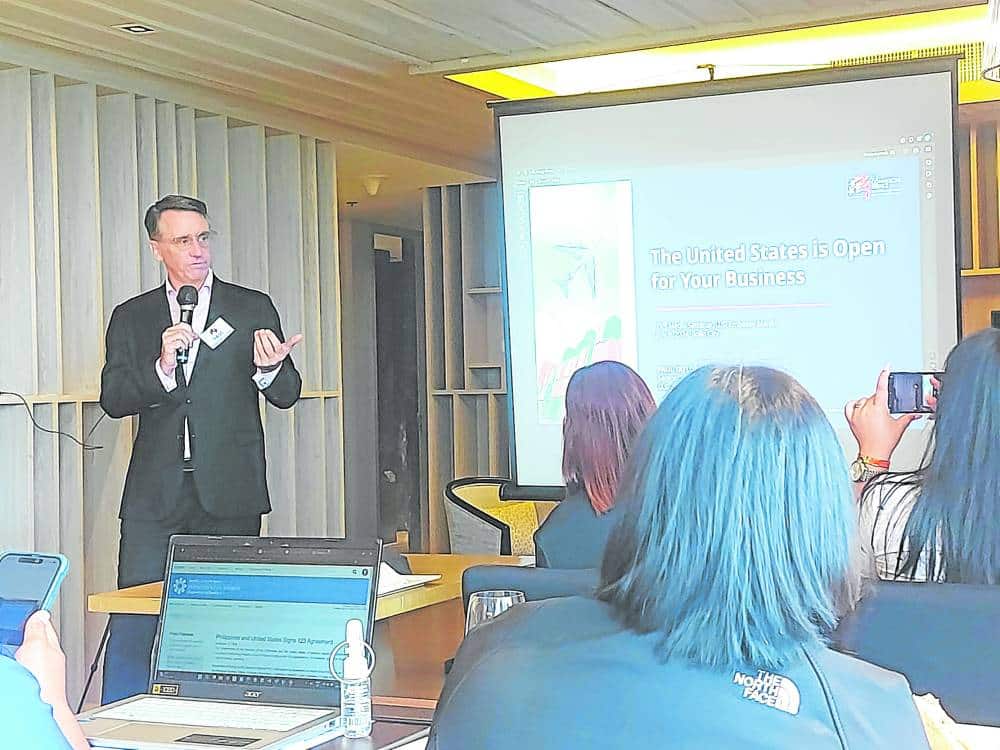Key US, PH nuclear pact enters into force

US Embassy Commercial Counselor Paul Taylor said on Tuesday that American companies are expected to ramp up commercial activities after the nuclear pact between the Philippines and the United States entered into force on July 2. (Photo by Jordeene B. Lagare)
ILOILO CITY — As many as 40 American companies are expected to venture into the Philippine nuclear space as the nuclear energy pact between the Philippines and the United States takes effect.
The US State Department announced on Tuesday that the breakthrough “123 agreement” on nuclear energy cooperation of both countries entered into force on July 2.
READ: PH-US civil nuclear energy pact enters into force
The PH-US nuclear energy agreement provides a legal framework to allow American companies to export nuclear material, equipment and components to another country.
It will permit the transfer of nuclear material, equipment (including reactors), components and information for nuclear research and civil nuclear energy production.
With the accord in place, US Embassy Commercial Counselor Paul Taylor said this was the “perfect time” to “begin to shift gears to a much more commercial focus.”
Commercial activities
“It is now in place and now American companies can really get to ramp up much of their commercial activities,” Taylor said during the US Embassy’s 16th Media Seminar entitled Powering Progress: The Path Toward the Philippines’ Clean Energy Transition.
“Over the last couple of years, the work in the civil nuclear space energy sector was focused on the regulatory framework,” he said during the seminar held here.
Work has ramped up with the creation by the US Embassy last May of the US Civil Nuclear Industry Working Group for Southeast Asia, bringing together American companies that are looking to bring their respective technologies to the Philippines.
The industry-led group will initially focus on the Philippines and will eventually work on other markets across Southeast Asia.
READ: US, Philippines to train Filipinos in nuclear power
Taylor said 14 firms that provide technology and services have joined the group that will facilitate the development of the civil nuclear sector in the country.
“These 14 companies, we expect that to expand to as many as 40 [firms],” he said.
The group will hold a virtual meeting on July 31 this year to move forward with nuclear-related investments in the country.
“It’s really just an opportunity to sit around the virtual table and discuss how the United States and the Philippines can work from a commercial standpoint and how are we going to work more closely in this area,” Taylor said.
“That’s probably the model that we will use for this industry-led working group because the companies are spread not only in the United States but really all over the world, some are in Singapore and elsewhere,” he added.
The US Embassy is closely working with the Department of Energy to work on various nuclear-related matters, including a supplier forum scheduled for mid-November this year.
He said American companies were expected to attend the gathering “to take very concrete steps” to establish a supply chain necessary for pursuing civil nuclear energy development projects across the country.
READ: DOE creates new division for nuclear energy
Aboitiz Power Corp., one of the few local firms keen on exploring nuclear energy opportunities in the local market, welcomed the Philippines’ nuclear deal with the United States.
The listed energy platform of the Aboitiz Group said the pact, which entered into force Tuesday, opens the doors for the Philippines to access nuclear equipment and components, as well as the needed research to pursue civil nuclear energy production.
However, the firm still sees “considerable challenges” in the realization of nuclear energy in the country.
“There are many more steps ahead in the policy environment; namely, establishing regulations and a regulatory body to ensure safety, updating technical expertise in the bureaucracy, preparing the talent pipeline of nuclear engineers and industry professionals, and building and sustaining public acceptance and trust,” it said.
Since late last year, the group has been exploring nuclear technologies in foreign markets, like the US and Canada, to gain more understanding of this source of energy.
Another company, Manila Electric Co. (Meralco), said in May that it was eyeing to build micro modular nuclear power plants by 2028. The Pangilinan-led company, however, declined to comment on this development.
The Department of Energy has yet to give its statement.
President Ferdinand Marcos Jr. has been eager to explore nuclear energy as an option to provide the country with cleaner sources of additional baseload capacity or plants that can run for 24 hours a day and wean the country away from coal.
Just this April, the Marcos administration showed enthusiasm to entice small modular nuclear power companies into the Philippines.
“We have 7,640 islands. This is going to be perfect for us. It’s going to be much safer, cleaner, and at the same time, it’s very new technology,” Philippine Ambassador to the US Jose Manuel Romualdez said at that time.
The president previously said that nuclear energy may become “a part of the Philippine energy mix by 2032.”
“We would be more happy to pursue this path with the United States as one of our partners,” the chief executive said in 2023.
